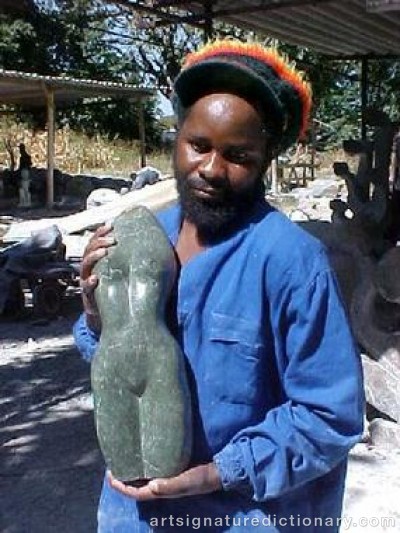
Celestino MUKAVHI
1972, Zimbabwe
Biography
Discover the life and artistic journey of Celestino MUKAVHI (born 1972, Zimbabwe), including key biographical details that provide essential context for signature authentication and artwork verification. Understanding an artist's background, artistic periods, and career timeline is crucial for distinguishing authentic signatures from forgeries.
Celestino Mukavhi biography:
Celestino was born at Bikita district hospital, Masvingo province on 27/9/1972. He is the last born son in a family of nine. His parents were rural subsistence farmers with little education. In 1975, tragedy struck when Mukavhi's mother was killed in crossfire during the war for liberation.
Living in the communal lands, his childhood was a happy one, except for the loss of his mother. His days were spent going to school, herding cattle, hunting with dogs and going fishing.
In 1987 he left high school after completing form 3 and began to work in the fields near by farm. Tragedy struck again in 1989 when Celestino's father was brutally murdered. With the main breadwinner now gone, Celestino was forced to go to Harare in search of better employment.
With no where to stay, he was sleeping on the streets. Early one morning, Boira Mteki was on his way to Chapungu, when he saw a young boy asleep by the roadside. Boira asked him if he would like to come and carve stones, well there has been no looking back for Celestino.
He learnt the basics of stone carving with Boira Mteki and assisted him for a six-month period - still recalling the first sculpture he assisted on, a sitting chameleon from green serpentine. He has also assisted Agnes Nyanhongo, Arthur Fata, Cosmas Muchenje and Garrison Machinjili.
In 1992 his sculpture Roots Woman was highly commended at the annual Zimbabwe Heritage exhibition and later that year he began to work on his own. In 1993 Celestino joined the Chapungu Artists Residency Programme and is one of the core groups of sculptors who have been associated with Chapungu and this programme.
Celestino has overcome much personal hardship and difficulty to arrive where he is today. His optimistic spirit is reflected in his sculpture, they are full of life and make bold naturalistic statements. His torsos, which have become increasingly popular, are a fine tribute to women. He says he likes women with good shapes and he certainly pays homage to them through his sculpture. Buxom, lively and full of movement, these torsos do not follow any academic rules, they are not constructed to a formula, and their sheer power of expression is indeed a joy to behold.
Having worked for a number of varying sculptors, Celestino has emerged with a style that is easily identifiable as his own and over the last few years has been a major part of many exhibitions. Always consistent and hard working, he is really committed to his sculpture and hopes that one day he will be in a position to help other young artists, just like Boira Mteki helped him.
Explore other artists
Discover other notable artists who were contemporaries of Celestino MUKAVHI. These artists worked during the same period, offering valuable insights into artistic movements, signature styles, and authentication practices. Exploring related artists makes it easier to recognize common characteristics and artistic conventions of their era.